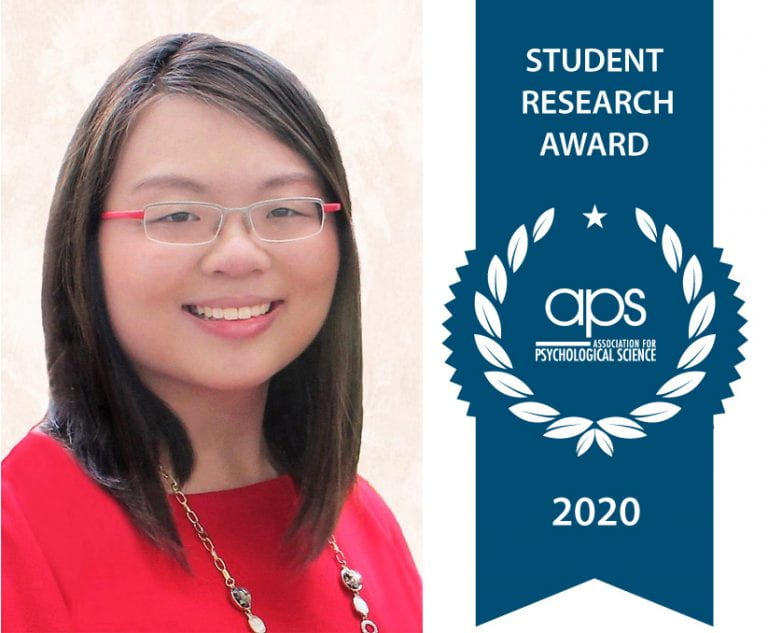We are proud that Dr. Wong Shi Hui Sarah from the NUS Department of Psychology has won the highly competitive 2020 APS Student Research Award conferred internationally by the Association for Psychological Science (APS) for her work on “The Derring Effect: Deliberate Errors Enhance Learning”.
The APS Student Research Award promotes and recognises outstanding research conducted by APS Student Affiliates worldwide. Dr. Sarah Wong, who recently completed her Ph.D. degree at our department and concurrently serves as an Instructor, is one of only four international winners of the 2020 APS Student Research Award. She is also the first recipient of this award in APS’s history to be from Singapore and NUS. Past recipients appear here.
The award-winning work was undertaken as part of Dr. Wong’s Ph.D. research at our department under the mentorship of Assoc Prof Stephen Lim. Whereas errors have traditionally been viewed as aversive events or, at best, serendipitous accidents, Dr. Wong challenged these views to test the counterintuitive learning benefits of deliberately responding incorrectly. In her research, she demonstrates that guiding learners to deliberately err even when they know the correct answers enhances learning—a phenomenon she has termed the “derring effect”.
Assoc Prof Stephen Lim commented, “Winners of the internationally coveted APS Student Research Award typically go on to fulfill illustrious careers in research and academia. Dr. Sarah Wong is the very first winner in APS’s history to be from Singapore. I join the NUS Office of the Provost in warmly congratulating Dr. Wong on her very fine achievement—we are inexpressibly proud of her!”
Alongside more than 1,200 posters from 41 participating nations, Dr. Wong’s research on the “derring effect” is currently presented in the inaugural APS Virtual Poster Showcase, which has brought the annual APS Convention online following its cancellation due to COVID-19. The APS Virtual Poster Showcase is open to registered attendees from 1 June through 1 September 2020. Registration is free.
Dr. Wong’s research has also been recently featured in the cover story of the APS Observer (July/August 2020), “Award-Winning Ideas from the APS Virtual Poster Showcase”, which shares the inspirations and personal stories behind the winning posters accepted to APS 2020. We reproduce Dr. Wong’s interview with APS in full below:
What drew you to this research?
Once, I made a costly error on a high-stakes exam. While I was berating myself for it, I also realized that I would (hopefully) never make the same error again. Gratefully, that error did not ruin my transcript, but that single experience did probably fuse with many other similar instances in my life to illuminate a flash of insight: Why not practice making errors in safe learning environments, so that we truly succeed when it matters most? This sparked the counterintuitive idea of deliberate erring in low-stakes contexts to unleash the potential of errors in education. I have my statistics lecturer to thank for what has turned out to be an “aha!” moment!
What did the research reveal that you didn’t already know?
By deliberately embracing our errors and wisely placing ourselves in the way of being wrong, we can overcome and rise stronger.
As psychologists, we routinely acquaint with fascinating examples of errors in human cognition that may serve fundamentally adaptive purposes. We are all fallible. Yet, throughout history, we have constantly striven to deny our ordinary, imperfect, and universal humanity. Thus, it is empowering to know that deliberately committing and correcting errors—the very events that we so often seek to avoid—can in fact benefit us. This research can potentially transform the way in which we approach education in practice and policy.
What are your plans going forward?
In the immediate future, I will be preoccupied with the current pipeline of ongoing projects that extend my work on the derring effect. On the longer runway, I expect to further develop my purpose and identity as a scientist, pursuing questions and translating findings that will positively impact our societies. For instance, what are the ultimate goals of learning and education in and beyond the classroom, how can we effectively achieve those goals, and what would these achievements mean for humanity? Along the way, I look forward to encountering and partnering with many like-minded individuals who will embark on this lifelong journey of inquiry together.
We heartily congratulate Dr. Wong!


